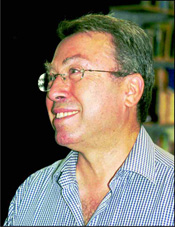Noam Semel: Builder of a New Empire
By Gad Nashon
Noam Semel is a builder of a new empire: the Israeli Cameri Theatre. For twenty years, Semel has been the producer/manager of this public theater, a performing arts cultural institution and a leading national theater in Israel. Semel is considered by some to be a genius and has been compared to the legendary Joseph Papp. Viewing the history of this theater, which was founded by Yosef Milo ("Papo") in 1944, some may reach the conclusion that Semel has indeed established a cultural empire.
It may also be considered as an integration of Broadway, off-Broadway, off-off-Broadway, plus regional theater. It also had performances scheduled in other countries and in cultural festivals including the USA and Argentina. It was the first Sabra/Hebrew theater, a counter to the Diaspora and the Russian influence which is evident in Habima theatre. It is remarkable that almost one million theatre goers enjoyed the Cameri productions in 2010!
Viewing the history of the Cameri is akin to viewing the life, problems, traumas, wars and conflicts of Israeli society over a sixty-year period. First, the Cameri demands quality. Secondly, the Cameri encouraged the rise of original Israeli-Hebrew plays and pushed the development of a new wave of Israeli plays. Third, there are no ideological linkages 'right or left', only pure devotion to the quality of its plays. Therefore, the Cameri is performing all over Israel from Jerusalem to the Negev's Sderot, the city which was a non-stop victim of the Hamas missile attacks.
Furthermore, the Cameri performs and will perform (against the objection of the extreme Israeli left) in Ariel, Gush Etzion and the small settlements.
Semel tries to attract each segment of Jews. First, to attract American Jews, some plays are for English speaking audiences. He also wants to present the Cameri to the many Israelis who live abroad. Semel has the experience to do this successfully since he served as Israel's Cultural Consul in New York City. It should be noted that Israelis hold the world record for theater-goers in comparison to its total population. Going to the theatre is a cultural/entertain-ment custom in Israel.
In discussing this phenomenon, Semel remarked: "First, the Jews have a long tradition of going to the theater. Second, Israelis love to see Israelis on the stage. Third, they like to see their problems, their conflicts, their wars, their Holocaust. They like to see themselves. It is a classical dialogue. Fourth, the aspect of togetherness: Israelis like to be with other Israelis." The Cameri always exposed the life in Israel. It staged the classical plays, but one of Cameri's premier productions was staged in May, 1948. It was the play adapted from Moshe Shamir's novel, He Walked through the Fields, about the lives of Israeli pioneers in the Kibbutzim.
There are at least two facts which explain the rise of this empire. First, the unique co-operation of two people; Semel and the artistic manager of the Cameri, director Omri Nitzan. It is a unique team which decides the entire repertoire of the Cameri. Second, in 2002, the Cameri moved to its new complex. The building started in 1997 with the support of then Tel-Aviv mayor, Ronnie Milo. 27 million dollars were invested in this complex consisting of five halls and many stages. This space encourages new ideas and productions such as one man shows. One such example is Pollard by Rami Baruch. Also, Semel introduced events during the day, adding another dimension to the traditional evening performances. In addition, inexpensive tickets are available to any play.
The Cameri runs the gamut of performances including classical, musicals, plays for youths, one man plays, and specials such as a musical based on the life of a well-known singer such as Shlomo Artzi or Zohar Argov. Recently, the Cameri produced a new version of Fiddler on the Roof, directed by Moshe Captan, and a new version of Yehoshua Sobol's Ghetto, directed by Omri Nitzan, about the Vilna Theatre during the Holocaust.
The Cameri always features an excellent company of actors. They represent the sub-division of Israeli society: Russians, Ethiopians, and Arabs. Semel has a non-stop challenge: he must achieve financial support for his empire. The Minister of Culture invested 12 million dollars last year and the city of Tel-Aviv (Mayor Ron Huldai) provided 11 million dollars. Cameri's total income was 78 million.
It is very hard to cover the huge expense of this huge empire even with the large amount of money at hand. How is that possible? In 2003, the Cameri produced 794 plays, but in 2006 it expanded to an incredible 13,211 plays. The scholar Gad Kiner wrote: "This is a state within a state."
The Cameri won many prizes plus the esteemed 2005's Israel Prize. Semel feels his legacy is creating a theatre with a specific face. It is a theater with a clear and unmistakable Israeli character. Semel, a non-stop worker, on the go day and night with an amazing energy and devotion, is truly the soul of the Cameri, which is undeniably a great contribution to Israel's culture.

